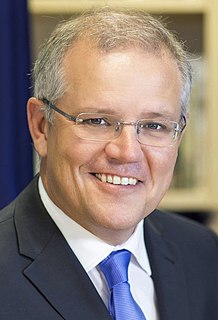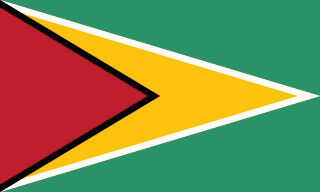
The Bharatiya Janata Party is one of the two major political parties in India, along with the Indian National Congress. As of 2018, it is the country's largest political party in terms of representation in the national parliament and state assemblies, and it is the world's largest party in terms of primary membership. BJP is a right-wing party, and its policy has historically reflected Hindu nationalist positions. It has close ideological and organisational links to the Rashtriya Swayamsevak Sangh (RSS).

Rahul Gandhipronunciation (help·info)[ˈraːɦʊl ˈɡaːnd̪ʱiː] is an Indian politician. He hails from a long line of politicians, known as the Nehru-Gandhi family, which has occupied a prominent place in the politics of India ever since the country gained independence in 1947. His great-grandfather was Jawaharlal Nehru, the first prime minister of India and also the longest serving Prime Minister of India having served for a total of seventeen years. Gandhi's grandmother Indira was the first woman Prime Minister of India and his father Rajiv Gandhi was the youngest prime minister of India to be sworn in to office. The son of Sonia and Rajiv Gandhi, he is the President of the Indian National Congress and serves such additional offices as the Chairperson of the Indian Youth Congress and the National Students Union of India. A member of the Indian Parliament, Gandhi represents the constituency of Amethi, Uttar Pradesh in the 16th Lok Sabha.

The 1968 United States Senate elections were elections for the United States Senate which coincided with the presidential election. Although Richard Nixon won the presidential election narrowly, the Republicans picked up five net seats in the Senate. Republicans would gain another seat after the election when Alaska Republican Ted Stevens was appointed to replace Democrat Bob Bartlett.

The 1944 United States House of Representatives elections were elections for the United States House of Representatives in 1944 that coincided with President Franklin D. Roosevelt's re-election to a record fourth term.

The 1940 United States House of Representatives elections coincided with President Franklin D. Roosevelt's re-election to an unprecedented third term. His Democratic Party narrowly gained seats from the opposition Republican Party, cementing their majority. However, the election gave firm control of the US House of Representatives and Senate to the New Dealers once again, as Progressives dominated the election.

The United States Senate elections of 1914, with the ratification of the 17th Amendment in 1913, were the first time that all seats up for election were popularly elected instead of chosen by their state legislatures. These elections occurred in the middle of Democratic President Woodrow Wilson's first term.

The United States Senate elections of 1916 were elections that coincided with the re-election of Democratic President Woodrow Wilson. Republicans gained a net pick-up of one seat from the Democrats. A 1916 special election gave Republicans a second seat.
An independent or nonpartisan politician is an individual politician not affiliated with any political party. There are numerous reasons why someone may stand for office as an independent.

The United States Senate elections of 1918 were held November 5, 1918, which was the midpoint of Woodrow Wilson's second term as President of the United States. The Republican Party gained control with a slim 2-seat majority after picking up a net six seats. The change in control was particularly important, as it meant that the Republicans were in a position to deny entry of the United States into the League of Nations. US participation in this new international institution was the centerpiece of Wilson's post-war foreign policy.

India held general elections to the 15th Lok Sabha in five phases between 16 April 2009 and 13 May 2009. With an electorate of 714 million, it was the largest democratic election in the world till the Indian General Elections 2014 held from 7 April 2014.

The Indian general election, 2014 was held to constitute the 16th Lok Sabha, electing members of parliament for all 543 parliamentary constituencies. Running in nine phases from 7 April to 12 May 2014, it was the longest election in the country's history. According to the Election Commission of India, 814.5 million people were eligible to vote, with an increase of 100 million voters since the last general election in 2009, making it the largest ever election in the world. Around 23.1 million or 2.7% of the total eligible voters were aged 18–19 years. A total of 8,251 candidates contested for the 543 Lok Sabha seats. The average election turnout over all nine phases was around 66.38%, the highest ever in the history of Indian general elections.

Jacinda Kate Laurell Ardern is a New Zealand politician serving as the 40th and current Prime Minister of New Zealand since 26 October 2017. She has also served as the Leader of the Labour Party since 1 August 2017. Ardern has been the Member of Parliament (MP) for the Mount Albert electorate since 8 March 2017; she was first elected to the House of Representatives as a list MP at the 2008 general election.

The 2016 United States presidential election was the 58th quadrennial American presidential election, held on Tuesday, November 8, 2016. The Republican ticket of businessman Donald Trump and Indiana Governor Mike Pence defeated the Democratic ticket of former Secretary of State Hillary Clinton and U.S. Senator from Virginia Tim Kaine, despite losing the popular vote. Trump took office as the 45th President, and Pence as the 48th Vice President, on January 20, 2017.
The United States Senate elections of 1824 and 1825 were elections for the United States Senate that saw the Jacksonians gain a majority over the Anti-Jacksonian National Republican Party.
Members of the 16th Lok Sabha were elected during the 2014 Indian general election. The elections were conducted in 9 phases from 7 April 2014 to 12 May 2014 by the Election Commission of India. The results of the election were declared on 16 May 2014. The Bharatiya Janata Party achieved an absolute majority with 282 seats out of 543, 166 more than previous 15th Lok Sabha. Its PM candidate Narendra Modi took office on 26 May 2014 as the 14th prime minister of independent India. The first session was scheduled to be convened from June 4 to June 11, 2014.

The 2019 Indian general election is scheduled to be held in seven phases from 11 April to 19 May 2019 to constitute the 17th Lok Sabha. The counting of votes will be conducted on 23 May, and on the same day the results will be declared.

The 2017 United Kingdom general election took place on Thursday 8 June 2017, having been called just under two months earlier by Prime Minister Theresa May on 18 April 2017 after it was discussed in cabinet. Each of the 650 constituencies elected one Member of Parliament (MP) to the House of Commons. The governing Conservative Party remained the largest single party in the House of Commons but lost its majority, resulting in the formation of a minority government with a confidence-and-supply arrangement with the Democratic Unionist Party (DUP) of Northern Ireland.

The 2020 United States presidential election, scheduled for Tuesday, November 3, 2020, will be the 59th quadrennial U.S. presidential election. Voters will select presidential electors who in turn on December 14, 2020, will either elect a new president and vice president or re-elect the incumbents. The series of presidential primary elections and caucuses are likely to be held during the first six months of 2020. This nominating process is also an indirect election, where voters cast ballots selecting a slate of delegates to a political party's nominating convention, who then in turn elect their party's presidential nominee.

The 2019 Australian federal election will elect members of the 46th Parliament of Australia. The election will be called following the dissolution or expiry of the 45th Parliament as elected at the 2016 double dissolution federal election.















